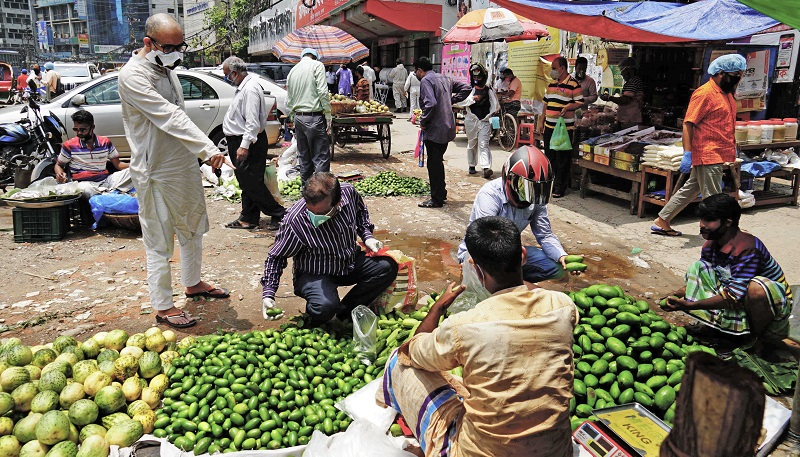
Rifat Islam
Rashidul Islam, a restaurant worker in Motijheel and the sole bread earner of a seven-member family, took ridesharing as a part-time job to support his family after his salary became irregular in the recent months.
“My salary is due for the last six months. It was tougher last year as my restaurant was closed due to lockdown,” Rashidul lamented on Saturday.
The middle-aged man continued carrying passengers ignoring a ban on ridesharing, claiming that he had little choice.
“Middle-class people like us can't even beg for alms. I also need to bear medical expenses of my mother, support the study of my two high-school going daughters,” Rashidul said.
Rashidul was afraid his entire might go hungry in the coming days as the government decided to impose a countrywide lockdown for a week from Monday.
“If the government now imposes a lockdown then my family won’t have any option but to go hungry,” he said.
Masum, a 14-year-old tea seller at the Teacher-Student Centre on the Dhaka University campus, supports his nine-member family as his day-labour father does not earn enough.
Masum used to study in class eight in a madrassah but decided to work in the tea stall after his father failed to make any profit from the small business he started last year due to lengthy lockdown.
A socio-economic assessment of COVID-19 carried out by UNDP in October 2020 found that the pandemic resulted in a severe contraction in the employment market.
At least one member in more than half of the beneficiary households (54.9 per cent) under the National Urban Poverty Reduction Programme permanently or temporarily lost their job or had to close the business during the lockdown, the study found.

The National Urban Poverty Reduction Programme (NUPRP) is a five-year multi-dimensional poverty reduction programme with numerous interventions covering four million urban poor, who are living in a large number of cities and towns across Bangladesh.
According to the study, the average monthly income has decreased significantly from baseline (2019) across different categories of households (40.1 per cent among the beneficiary households under NUPRP).
The drastic decline in income has been caused by a host of factors, such as job loss, truncated salary, and non-activity or lack of small and medium business activity.
After the first lockdown for more than two months from March 25 to May 30, 2020, about 56.2 per cent of the beneficiary households under NUPRP went below the poverty line, the study found. This was 41.7 per cent during the baseline of the study in 2019.
Poor people such as Rikshaw-puller Suruj Mia feared a fresh lockdown would have a devastating effect on his family.
“I had to borrow Tk 19,000 to run my family during the lockdown last year. I was slowly repaying the debt in the last few months. Now if there is a lockdown again, I just don’t know what I will do,” said Suruj.
“Maybe I will go back to my village and die slowly with my family, hungry,” he added.
ri/am